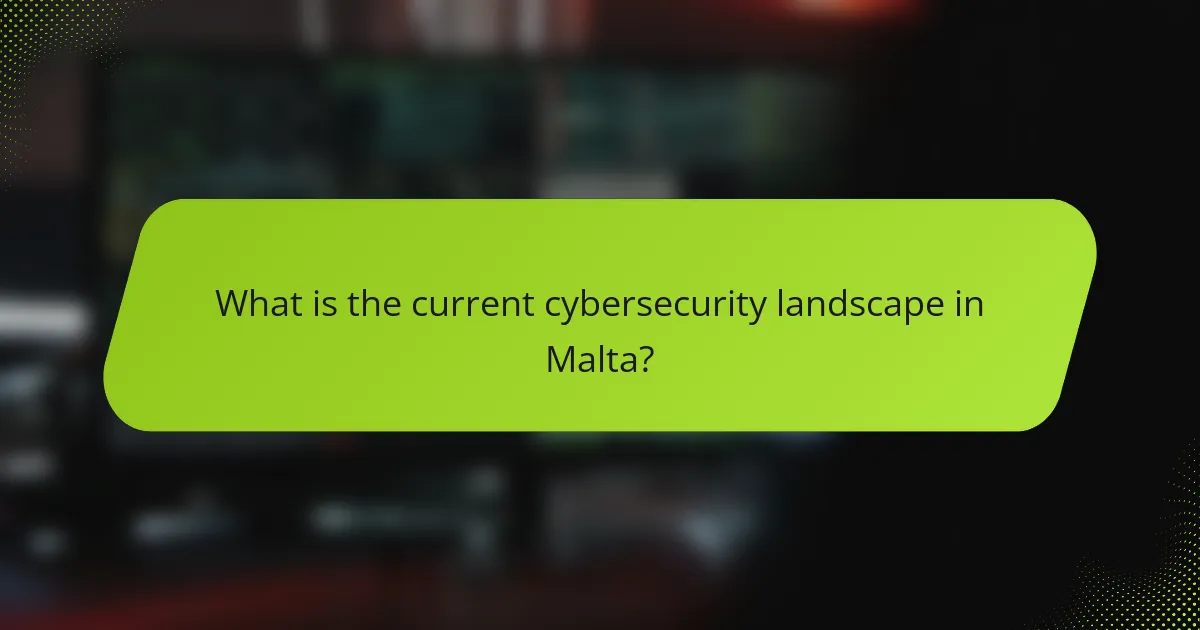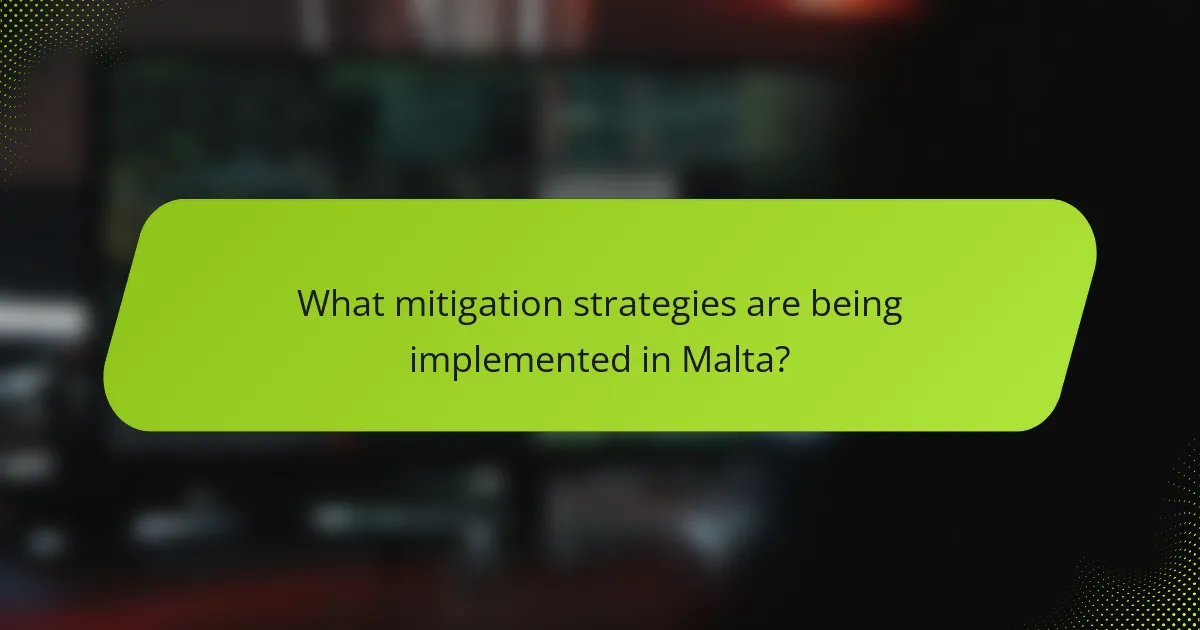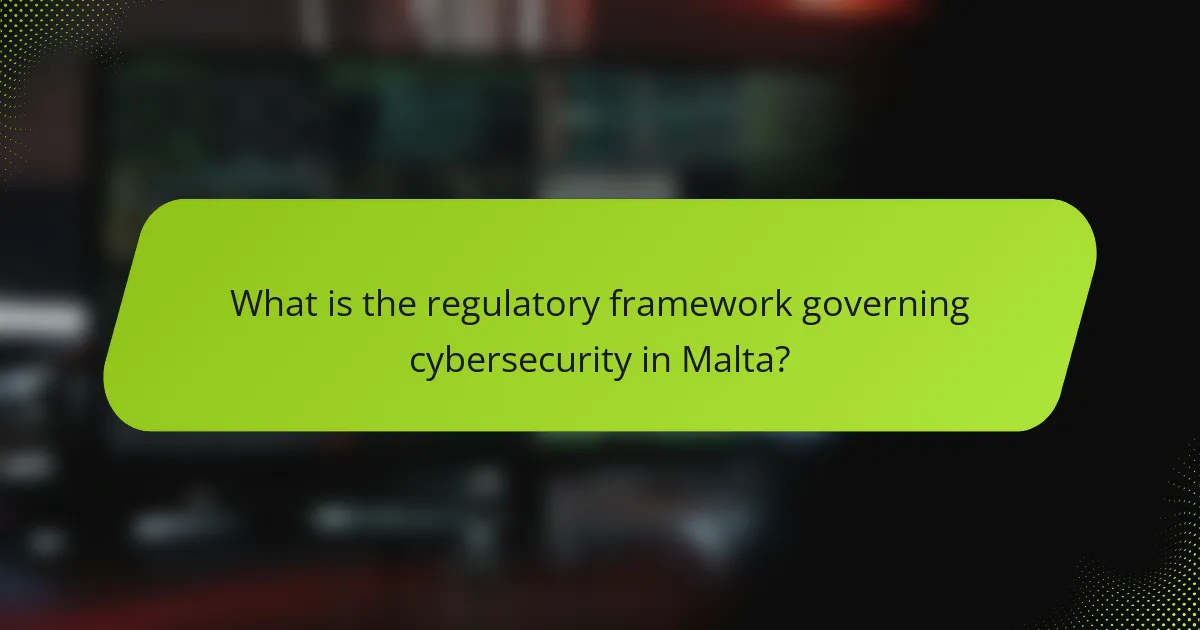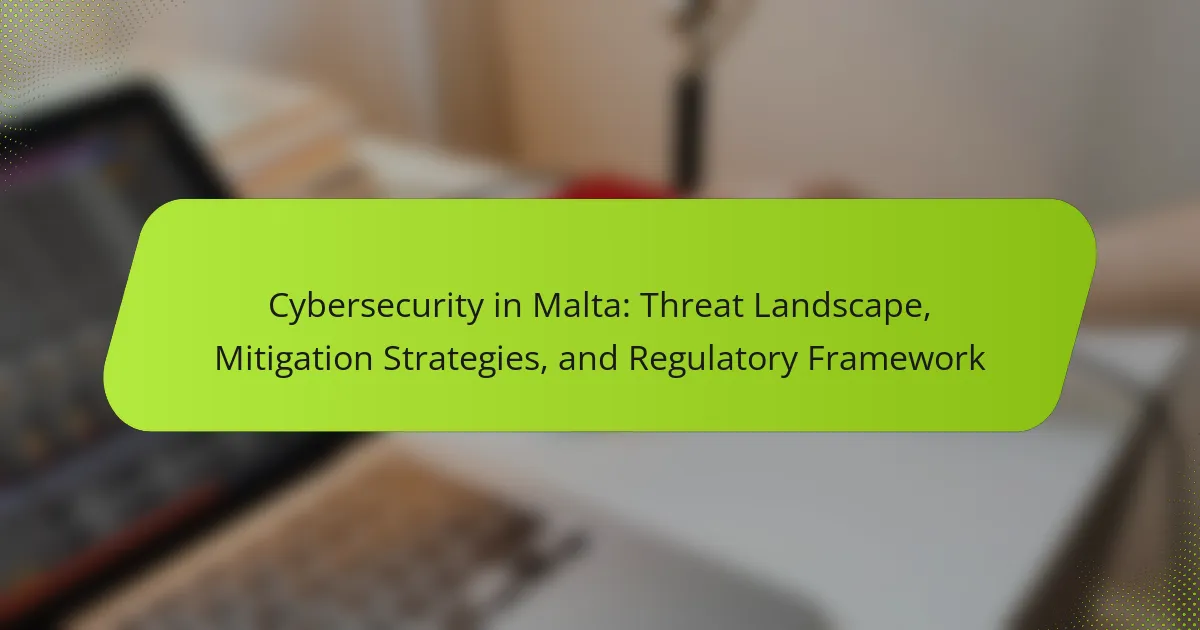
What is the current cybersecurity landscape in Malta?
The current cybersecurity landscape in Malta is characterized by increasing threats and proactive measures. Malta faces various cyber threats, including ransomware, phishing, and data breaches. The government has implemented the National Cybersecurity Strategy to address these challenges. This strategy includes enhancing public-private partnerships and improving incident response capabilities. Malta also established the Malta Cyber Security Agency in 2021 to oversee cybersecurity initiatives. The agency focuses on raising awareness and providing resources for businesses and individuals. Recent reports indicate a rise in cyber incidents, emphasizing the need for robust security practices. Overall, Malta is actively working to strengthen its cybersecurity posture amid evolving threats.
How prevalent are cyber threats in Malta?
Cyber threats are increasingly prevalent in Malta. Recent reports indicate a rise in cyber incidents targeting both public and private sectors. In 2022, Malta experienced a significant increase in ransomware attacks. The National Cyber Security Strategy highlights that phishing attempts have also surged. A survey from the Malta Communications Authority found that 40% of businesses reported cyber threats in the past year. Additionally, the European Union Agency for Cybersecurity noted Malta’s growing vulnerability due to digital transformation. These trends emphasize the urgent need for enhanced cybersecurity measures in the country.
What types of cyber threats are most common in Malta?
The most common types of cyber threats in Malta include phishing attacks, ransomware, and malware infections. Phishing attacks target individuals and organizations to steal sensitive information. Ransomware incidents have increased, where attackers encrypt data and demand payment for its release. Malware infections often compromise systems and networks, leading to data breaches. According to the Malta Cyber Security Agency, these threats have been on the rise, reflecting global trends. The agency reported a significant increase in reported incidents over the past year, highlighting the urgent need for enhanced cybersecurity measures.
How have recent events influenced the threat landscape?
Recent events have significantly altered the threat landscape in cybersecurity. The increase in remote work due to the COVID-19 pandemic has expanded the attack surface for cybercriminals. Cyberattacks targeting remote workers have surged, with phishing and ransomware incidents becoming more prevalent. According to the Cybersecurity and Infrastructure Security Agency (CISA), ransomware attacks increased by 300% in 2020. Additionally, geopolitical tensions have led to more sophisticated state-sponsored cyber threats. These factors collectively contribute to a more complex and dynamic threat environment, necessitating enhanced cybersecurity measures.
Why is cybersecurity important for Malta’s economy?
Cybersecurity is crucial for Malta’s economy because it protects sensitive data and maintains trust in digital services. The digital landscape in Malta is growing rapidly, with increasing reliance on technology in various sectors. A strong cybersecurity framework helps prevent data breaches and cyberattacks, which can lead to financial losses. According to the European Union Agency for Cybersecurity, the cost of cybercrime can reach billions annually. Additionally, robust cybersecurity measures attract foreign investments by ensuring a secure business environment. This enhances Malta’s reputation as a safe destination for technology and finance sectors. Moreover, cybersecurity compliance with EU regulations is essential for maintaining market access. Therefore, effective cybersecurity is vital for economic stability and growth in Malta.
What sectors are most vulnerable to cyber attacks in Malta?
The sectors most vulnerable to cyber attacks in Malta include finance, healthcare, and critical infrastructure. The financial sector is often targeted due to the sensitive data and monetary transactions involved. Healthcare systems face risks from ransomware attacks, compromising patient data and operational capabilities. Critical infrastructure, such as energy and transportation, is also susceptible, as disruptions can have widespread impacts. According to the Malta Cyber Security Strategy, these sectors have reported increased incidents of cyber threats in recent years. The National Cyber Security Strategy emphasizes the need for enhanced protective measures in these vulnerable areas.
How do cyber threats impact businesses and consumers in Malta?
Cyber threats significantly impact businesses and consumers in Malta by causing financial losses, data breaches, and reputational damage. Businesses face increased operational costs due to the need for enhanced cybersecurity measures. According to a report by the Malta Communications Authority, 40% of local businesses experienced cyber incidents in the past year. Consumers are at risk of identity theft and fraud, leading to financial and emotional distress. The growing prevalence of ransomware attacks further exacerbates these issues, with a notable increase in incidents reported in 2023. Overall, the cyber threat landscape poses serious challenges for both businesses and consumers in Malta.

What mitigation strategies are being implemented in Malta?
Malta is implementing various cybersecurity mitigation strategies to enhance its defenses. The government has established the National Cyber Security Strategy to guide these efforts. This strategy includes measures such as continuous monitoring of cyber threats. Additionally, Malta has set up the Cyber Security Incident Response Team (CSIRT) to respond to incidents effectively. Training and awareness programs for both public and private sectors are also part of the strategy. Collaboration with international organizations enhances knowledge sharing and best practices. These initiatives aim to protect critical infrastructure and sensitive data. Malta’s commitment to cybersecurity is evident through its legislative framework and investment in technology.
How are organizations in Malta addressing cybersecurity challenges?
Organizations in Malta are addressing cybersecurity challenges through enhanced regulations and collaboration. The Maltese government has implemented the General Data Protection Regulation (GDPR) to strengthen data protection measures. Additionally, organizations are investing in cybersecurity training for employees to reduce human error. They are also adopting advanced technologies like artificial intelligence to detect and respond to threats. Public-private partnerships are being formed to share information on cybersecurity incidents. The Malta Cyber Security Agency provides guidance and resources to help organizations improve their security posture. These initiatives have led to a more resilient cybersecurity framework in Malta.
What best practices are recommended for cybersecurity in Malta?
Recommended best practices for cybersecurity in Malta include implementing strong password policies. Organizations should enforce the use of complex passwords and regular updates. Regular employee training on phishing and social engineering is essential. This training helps staff recognize and respond to potential threats. Keeping software and systems updated reduces vulnerabilities. Regular security audits and assessments identify weaknesses in the infrastructure. Utilizing firewalls and intrusion detection systems enhances network security. Data encryption protects sensitive information from unauthorized access. Following these practices aligns with the guidelines set by the National Cyber Security Strategy of Malta.
How effective are current mitigation strategies in reducing risks?
Current mitigation strategies in cybersecurity are moderately effective in reducing risks. These strategies include firewalls, encryption, and regular software updates. According to the European Union Agency for Cybersecurity, implementing these measures can decrease the likelihood of successful cyberattacks by up to 70%. However, new threats continue to emerge, often outpacing existing defenses. A report by Cybersecurity Ventures predicts that cybercrime costs will reach $10.5 trillion annually by 2025, indicating ongoing vulnerabilities. Therefore, while strategies are beneficial, they require continuous adaptation and enhancement to remain effective.
What role does collaboration play in enhancing cybersecurity?
Collaboration plays a critical role in enhancing cybersecurity by fostering information sharing among organizations. It allows for the exchange of threat intelligence, which helps in identifying vulnerabilities and emerging threats. Collaborative efforts lead to the development of best practices and coordinated responses to incidents. For instance, the Cybersecurity and Infrastructure Security Agency (CISA) emphasizes the importance of partnerships in strengthening national security. Research indicates that organizations participating in information-sharing platforms can reduce the risk of cyber incidents by up to 50%. Furthermore, collaboration enables the pooling of resources, making advanced security technologies more accessible. This collective approach enhances overall resilience against cyber threats.
How are public and private sectors working together in Malta?
Public and private sectors in Malta collaborate through initiatives aimed at enhancing cybersecurity. The government has established frameworks that encourage partnerships with private entities. These collaborations focus on sharing information and resources to combat cyber threats. Regular forums and workshops are organized to facilitate dialogue between sectors. The National Cyber Security Strategy outlines the roles of both sectors in safeguarding digital infrastructure. Public agencies provide guidelines and support, while private companies contribute expertise and technology. This synergy is crucial for addressing the evolving cybersecurity landscape in Malta. The ongoing collaboration is vital for maintaining national security and resilience against cyber incidents.
What international partnerships are Malta engaged in for cybersecurity?
Malta is engaged in several international partnerships for cybersecurity. It collaborates with the European Union Agency for Cybersecurity (ENISA) to enhance its cybersecurity framework. Malta is also a member of the Global Forum on Cyber Expertise (GFCE), promoting international cooperation in cybersecurity capacity building. Additionally, Malta participates in the NATO Cooperative Cyber Defence Centre of Excellence (CCDCOE) for knowledge sharing and research. These partnerships aim to strengthen Malta’s cybersecurity capabilities and resilience against cyber threats.

What is the regulatory framework governing cybersecurity in Malta?
The regulatory framework governing cybersecurity in Malta is primarily shaped by the General Data Protection Regulation (GDPR) and the National Cyber Security Strategy. GDPR provides guidelines for data protection and privacy in the European Union, impacting how organizations manage personal data. The National Cyber Security Strategy outlines the government’s approach to enhancing the country’s cybersecurity resilience.
Additionally, the Malta Digital Innovation Authority (MDIA) oversees the implementation of cybersecurity measures and compliance with relevant laws. The Cybersecurity Act, enacted in 2021, further strengthens the legal framework by establishing a regulatory authority for cybersecurity. This act mandates risk assessments and incident reporting for critical infrastructure operators.
Malta’s adherence to EU directives ensures alignment with broader cybersecurity standards across member states. These frameworks collectively create a robust environment for addressing cybersecurity threats and protecting digital assets in Malta.
What laws and regulations are in place for cybersecurity in Malta?
Malta has several laws and regulations governing cybersecurity. The primary law is the Data Protection Act, which aligns with the EU General Data Protection Regulation (GDPR). This act establishes guidelines for data processing and ensures the protection of personal data. Additionally, the Computer Crime Act addresses cybercrime offenses, including unauthorized access to computer systems. The National Cyber Security Strategy outlines the government’s approach to enhancing national cybersecurity. The Malta Communications Authority also regulates electronic communications, contributing to cybersecurity measures. These regulations are enforced to protect individuals and organizations from cyber threats.
How does the GDPR impact cybersecurity practices in Malta?
The GDPR significantly impacts cybersecurity practices in Malta by enforcing strict data protection standards. Organizations must implement robust security measures to protect personal data. This includes encryption, access controls, and regular security assessments. Compliance with GDPR mandates that data breaches be reported within 72 hours. Failure to comply can result in substantial fines, reaching up to €20 million or 4% of annual global turnover. The GDPR also requires organizations to conduct Data Protection Impact Assessments (DPIAs) for high-risk processing activities. This ensures that potential risks to personal data are identified and mitigated. Overall, GDPR drives organizations in Malta to enhance their cybersecurity frameworks to safeguard personal data effectively.
What are the penalties for non-compliance with cybersecurity regulations?
Penalties for non-compliance with cybersecurity regulations can include fines, legal action, and reputational damage. In Malta, the General Data Protection Regulation (GDPR) imposes fines up to €20 million or 4% of annual global turnover, whichever is higher. The National Cyber Security Strategy mandates compliance with specific cybersecurity measures. Failure to comply may result in additional sanctions from regulatory authorities. Businesses may also face civil lawsuits from affected parties. Non-compliance can lead to loss of customer trust and market position. The severity of penalties often depends on the nature and extent of the violation.
How does Malta ensure compliance with cybersecurity standards?
Malta ensures compliance with cybersecurity standards through a robust regulatory framework. The National Cyber Security Strategy outlines the government’s commitment to cybersecurity. The Malta Communications Authority oversees the implementation of these standards. Regular audits and assessments are conducted to ensure adherence. Additionally, Malta aligns its regulations with EU directives, enhancing compliance. Training programs for businesses promote awareness of cybersecurity best practices. Collaboration with international organizations further strengthens Malta’s cybersecurity posture. These measures collectively help maintain high cybersecurity standards in the country.
What role do audits and assessments play in regulatory compliance?
Audits and assessments are crucial for ensuring regulatory compliance. They help organizations evaluate their adherence to laws and standards. Regular audits identify gaps in compliance and areas for improvement. Assessments provide a framework for measuring risk and security posture. Together, they promote accountability and transparency within organizations. In Malta, regulatory bodies require periodic audits to maintain compliance with cybersecurity regulations. These processes help mitigate risks and protect sensitive information. Furthermore, they support continuous improvement in security practices. Effective audits and assessments ultimately enhance trust with stakeholders and regulators.
How are organizations in Malta educated about cybersecurity regulations?
Organizations in Malta are educated about cybersecurity regulations through various training programs and workshops. The Malta Cyber Security Strategy emphasizes awareness and compliance. Government agencies, such as the Malta Communications Authority, provide resources and guidance. Additionally, private sector organizations offer specialized training sessions. These initiatives aim to enhance understanding of legal obligations. Regular updates on regulations are communicated through official channels. Collaboration with international bodies also contributes to education efforts. This multi-faceted approach ensures organizations stay informed about evolving cybersecurity regulations.
What practical steps can organizations take to improve their cybersecurity posture?
Organizations can improve their cybersecurity posture by implementing a multi-layered security strategy. This includes conducting regular risk assessments to identify vulnerabilities. Organizations should also invest in employee training on cybersecurity best practices. Regular software updates and patch management are essential to protect against known threats. Implementing strong access controls can limit unauthorized access to sensitive information. Organizations should also deploy firewalls and intrusion detection systems to monitor and block malicious activities. Regular backups of critical data can ensure recovery in case of a cyber incident. Lastly, developing an incident response plan enables organizations to respond effectively to security breaches. These steps collectively enhance an organization’s ability to defend against cyber threats.
The main entity of the article is cybersecurity in Malta, encompassing its current threat landscape, mitigation strategies, and regulatory framework. The article outlines the increasing prevalence of cyber threats such as ransomware and phishing, highlighting the government’s proactive measures, including the National Cyber Security Strategy and the establishment of the Malta Cyber Security Agency. It discusses the impact of cyber threats on businesses and consumers, the vulnerabilities of key sectors, and the importance of collaboration between public and private entities. Additionally, the article details the regulatory framework, including GDPR compliance, and provides practical steps organizations can take to enhance their cybersecurity posture.
